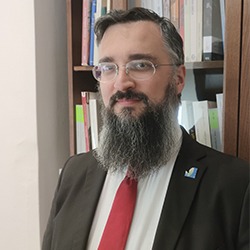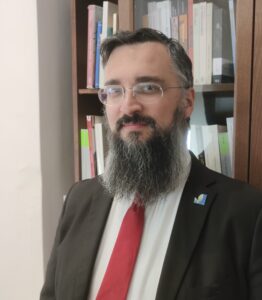Latinitas Viva 1
An opportunity of great importance for those who value the culture of the Fathers: to learn Latin truly and well, with care and depth. The lessons ensure knowledge of classical Latin, while always providing timely references to the evolution of Christian Latin: an essential tool for the legal, philosophical, and theological knowledge of Catholic civilization!
Overview
Admission
Admission is free and no prior knowledge is requested.
Objectives
- Understanding of a Latin text, without using the dictionary
- In-depth knowledge and active use of all the most fundamental structures of Latin syntax and grammar
- Knowledge of the 1200 most frequent words of Latin classical literature
- Introduction to Latinitas Christiana
- Ability to write and speak in Latin
Program
Through the reading of texts written in Latin and specifically designed to encourage language acquisition, students will learn morphology, syntax and fundamental phraseology in acquiring classical and patristical Latin. Lessons will be held completely in Latin, according to the fundamentals of inductive-contextual methodology.Renewing the Church’s tradition in the teaching of Latin and using the most advanced techniques for the teaching of modern languages, the active use of Latin language both by the students and the teacher turns passive learning into an active competence, thus ensuring a sound knowledge of the language.
View the program in details
The course will be held in classroom and online. The IISC will give the students a link (upon request) to attend the course via live streaming. Lessons in streaming will be recorded and they will stay available for the students to see for a week.
CONTINUE STUDYING WITH US
Upon the completion of the course, students who have attended at lest the 75% of class hours, may access the course of Latin 2.
It is of the utmost importance that students have their textbooks since the first day of classes.
1. H. H. Ørberg, Lingua Latina per se illustrata – Pars I: Familia Romana (any edition)
2. F. Pirrone, Grammatica latina: guida allo studio di Familia Romana, Edizioni Istituto Italiano di Studi Classici for students who cannot read Italian: M. Neumann, A companion to Familia Romana, Focus)
3. H. H. Ørberg, Exercitia Latina (Cap I-XXXV) (any edition)
– Students who have attended at least 75% of class hours may obtain a course completion certificate.
– Those who wish to obtain university certifications (6 CFU/ECTS) should pass the final exam with an evaluation fo at least 18/30.
This certification is issued by both the Italian Institute of Classical Studies (IISC) and the Pontifical University of the Holy Cross (PUSC).
The course is also recognized by the MIUR – Regional School Office for Lazio as valid for the professional training of teaching staff.
Location
Pontificia Università della Santa Croce – Piazza Sant’Apollinare 49, Roma
First lesson
Last lesson
No class days
2024 December, 26
2025 January, 2
2025 January, 30
2025 February, 6
2025 February, 13
2025 April, 17
2025 April, 24
2025 May, 1
Exam sessions
2025 June, 18
2025 September, 24
First lesson
Last lesson
No class days
2023 December, 25
2024 January, 1
2024 January, 22
2024 January, 29
2024 February, 5
2024 March, 25
2024 April, 1
Exam sessions
2024 June, 19
2024 September, 25
Instructor
Founder of the Italian Institute for Classical Studies, Federico Pirrone is professor in Teaching of Classical Languages and Latin Composition and in Medieval and Renaissance Literature at the Pontificium Institutum Altioris Latinitatis of the Pontifical Salesian University in Rome. He also teaches Latin Language and Literature at the Holy Cross University in Rome.
He earned, with honors, a PhD in Teaching of Latin writing the thesis “Historical and Theoretical Principles in the application of the inductive-contextual methodology to the teaching of Latin Language” (Universidad de Navarra). He graduated with honor in Philology, Literature and History of the Ancient World (La Sapienza University).
For the IISC Editions, he has published Grammatica Latina: guida allo studio di Familia Romana, the first grammar specifically written for studying Latin with the inductive-contextual methodology. He is author of many essays and papers on the history of the teaching of Classical languages.
His main interests are in the history of the teaching of Latin and Anglo-Saxon Medieval historiography.
You May Like
Latin Conversation and Composition 1
- Dates and times: Wednesday 4:15 - 5:00 pm (November-May)
- Teaching method: in presence and online (live streaming)
Admission Access to the first year is free and no pre-requisites are requested. The course is strongly recommended to the …
Biblical Hebrew 1
- Dates and times: Thursday 6:00 - 7:30 pm (October-May)
- Teaching method: in presence and online (live streaming)
Admission No admission test is required for the first year. Objectives: Ability to read biblical texts written in square letter …
Ancient Greek 1
- Dates and times: Monday 5:30-7:30 (October-May)
- Teaching method: in presence
Greece will never cease to captivate with the tale of its soul: all it takes is learning to listen to its ancient voice to...

- Start/end dates: 2024 October, 24 - 2025 May, 29
- Teaching method: In presence and online (live streaming)
- Schedule: Thursday 3:00-5:30 pm
- Duration: 83 academic hours (25 lessons)
- Location: Pontifical University of the Holy Cross (P.zza Sant'Apollinare, 49 - Roma)
- Titles released: 6 CFU / ECTS + Teachers’ updating, recognized by the MIUR
- Language Latin
- Limited enrollment: up to 20 participants
- Academic fees: € 690 (payable in instalments)
- Recommended for: ecclesiastics





